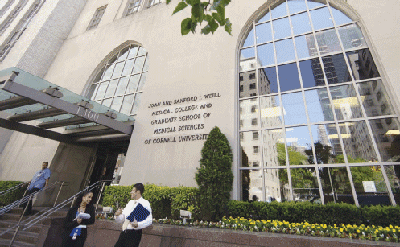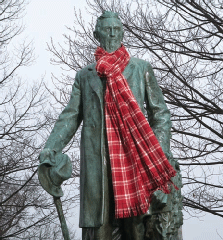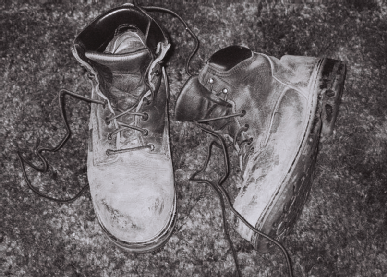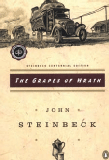AAD Closes Regional Offices, Cuts Personnel; Alum Charged in Madoff Investment Scheme; Campus Libraries Face Cutbacks, Closure; Investors Snap Up CU Bonds; Hundreds Take Early Retirement; Highlanders on the Hill: CU's New Tartan; Moody-Adams Leaves for Columbia; Dust Bowl Tale Is Freshman Reading Choice; Hardship Fund Aids Employees; Fungi to Return to China; New Asian Student Center

Manhattan project: The Medical college's namesakes and longtime benefactors made another major gift.
Weills Give $170 Million
Longtime University benefactors Joan and Sanford Weill '55 have made a $170 million cash payment to the Medical college, opting to fulfill their pledge now—at a time when many nonprofits are struggling to raise funds during the economic downturn—rather than via a bequest after their deaths. The gift goes toward the Medical college's $1.3 billion capital campaign.
The Weills have structured the gift to offer a challenge to other potential donors: for each $1.50 given to support the college's new research building, $1 of the Weills' gift will be allocated. The challenge is meant to encourage other donors by making naming opportunities more accessible. For example, a donor giving $150,000 to the building project would have a naming opportunity equal to a gift of $250,000. "The world has changed in the past six months," says Weill, chairman of the college's Board of Overseers. "In order to ensure that the research building project moves forward, we decided to make our gift available to other donors who may be holding back." To date, the Weills and their family foundation have given more than $500 million to Cornell; the Medical college is named in their honor.
AAD Closes Regional Offices, Cuts Personnel
In March, responding to both an internal "strategic planning" process and mandated budget cuts, vice president for alumni affairs and development Charlie Phlegar announced a major reorganization of the division. Regional offices will be closed in Philadelphia, Chicago, Boston, Houston, Miami, and San Francisco—leaving only the one in New York City—and there will be significant staff reductions in Ithaca. In all, forty-one AAD employees have been or will be laid off; thirty-five positions are also being eliminated through attrition or reassignment. "These were difficult decisions that were carefully and thoughtfully made," says Phlegar. "Every effort was made to balance the sincere concern we have for our current employees with the financial realities we face." As part of the reorganization, eight major gift officers will move from University Development to the colleges and units, some AAD operations will be shifted to other divisions, and there will be "strategic investment" in alumni programs, with an emphasis on better use of technology for communicating with graduates.
Alum Charged in Madoff Investment Scheme
David Friehling '81 has been charged with six counts of securities fraud in connection with Bernard Madoff's $65 billion Ponzi scheme. The auditor was released on $2.5 million bail after surrendering at a federal courthouse in Manhattan in mid-March. His three-person accounting firm, Friehling & Horowitz, was responsible for certifying Madoff Investment Securities' finances. While Friehling has not been accused of being directly involved in the fraud that swindled 4,800 investors out of their savings, he was charged with deceiving authorities for falsely claiming that he had checked Madoff's books. "He did little or no testing, no verification of the 'facts' he certified," said the head of New York's FBI office. If convicted, Friehling could be sentenced to as many as 105 years in prison.
Campus Libraries Face Cutbacks, Closure
Cornell's Physical Sciences Library will close at the end of the academic year, the victim of budget cuts and the shift toward electronic resources. The Clark Hall facility, one of the University Library's twenty units, will continue to have an online presence. "We will flex, reach out in many directions, and think well beyond the traditional branch library model as we reshape this library, its collections, and services to support the evolving research environment for the twenty-first century," says Leah Solla, MS '97, the library's coordinator.
In April, the University Library announced across-the-board cuts for 2010, calling for a 7 percent reduction in funding for new materials in the endowed colleges. The change will affect the acquisition of books, journal subscriptions, access to online databases, audiovisual purchases, and rare manuscripts, among other areas. "We won't be cutting things wholesale," says associate university librarian John Saylor. "We're examining our buying plans very carefully and are making strategic decisions that take the diverse needs of the various disciplines into account." In the current fiscal year, the University spent $13.5 million on acquisitions in the endowed colleges.
Investors Snap Up CU Bonds
As part of its economic recovery plan, Cornell issued $500 million in taxable bonds in March—and they sold out in less than half an hour. The bonds were rated AA by Standard and Poor's. Says President David Skorton: "This approach—which is similar, though more modest in size, to that being utilized by other large universities— will alleviate pressure on the endowment and other sources of funding as may be necessary over the next several years to meet operating shortfalls and other potential liquidity needs."
Hundreds Take Early Retirement
All of the 432 staff who applied for early retirement under a University cost-saving initiative have been approved, vice president for human resources Mary Opperman announced in April. Open to non-professorial employees in the endowed and statutory colleges, the Staff Retirement Incentive Program applied to workers aged fifty-five and up with at least ten years of service. It offered a one-time payment of a year's salary, three years of retirement contributions by the University, and enrollment in the usual benefits programs open to retirees. Participants must retire by June 30 and cannot return to a benefits-eligible position at Cornell for three years.

Highlanders on the Hill: CU's New Tartan
To the sound of bagpipes playing the alma mater, the University unveiled its new tartan at the Cornell Design League Fashion Show in April—making it the first Ivy League school to have its own plaid registered with the Scottish Tartan Authority. The pattern, created by fiber science and apparel design major Jessie Fair '09, is wine red and accented with cream, gray, and blue stripes. "Now Cornellians can show their colors with a visual brand that represents the school," says Mort Bishop III '74, a University trustee and president of Pendleton Woolen Mills. Bishop's company will make official Cornell scarves, stadium blankets, and other products using the tartan. The first 600 scarves, which Pendleton donated to the University, are currently on sale for $50 each; they must be purchased in person at the fiber science department office in Martha Van Rensselaer Hall.
Moody-Adams Leaves for Columbia
 Vice provost for undergraduate education Michele Moody-Adams will leave Cornell at the end of the academic year to become dean of Columbia College—she'll be the first woman and first African American in the post—and vice president for undergraduate education at Columbia University. A philosophy professor on the Hill since 2000, she has been in her current position since 2005.
Vice provost for undergraduate education Michele Moody-Adams will leave Cornell at the end of the academic year to become dean of Columbia College—she'll be the first woman and first African American in the post—and vice president for undergraduate education at Columbia University. A philosophy professor on the Hill since 2000, she has been in her current position since 2005.
The University said goodbye to another prominent African American administrator this spring: longtime assistant vice president for student and academic services LeNorman Strong. He left Cornell for the University of California, Berkeley, where he will serve as associate vice chancellor for residential and student service programs.

Shoe In: Construction worker Erica Harding's image of her boots is among the photographs currently on display at the ILR Conference Center. "Unseenamerica New York State: Pictures of Working Lives Taken by Working Hands" runs through July 18.
Dust Bowl Tale Is Freshman Reading Choice
 John Steinbeck's The Grapes of Wrath has been selected for this year's New Student Reading Project. The classic novel tells the story of the Joads, a family of sharecroppers who leave their drought-plagued farm in Oklahoma's dust bowl for California's fertile Central Valley. "The book makes us reflect on the causes and effects of widespread homelessness and unemployment, the nature of economic and social justice, and the consequences of taking the vibrancy of the natural world for granted," says Michele Moody-Adams, vice provost for undergraduate education. "It's a good thing for undergraduates to have to confront these questions at the current moment."
John Steinbeck's The Grapes of Wrath has been selected for this year's New Student Reading Project. The classic novel tells the story of the Joads, a family of sharecroppers who leave their drought-plagued farm in Oklahoma's dust bowl for California's fertile Central Valley. "The book makes us reflect on the causes and effects of widespread homelessness and unemployment, the nature of economic and social justice, and the consequences of taking the vibrancy of the natural world for granted," says Michele Moody-Adams, vice provost for undergraduate education. "It's a good thing for undergraduates to have to confront these questions at the current moment."
Though the book won the Pulitzer Prize in 1940, its portrayal of migrant farmers drew harsh criticism—but it has since been accepted as one of the great American novels of the twentieth century and helped earn Steinbeck the Nobel Prize for Literature. It will be read by the entire incoming freshman class, new transfer students, and faculty and staff who will lead group discussions at orientation in August. The project will be supplemented with online content at http://reading.cornell.edu.
Hardship Fund Aids Employees
In trying economic times, logic says that more people would be lining up to receive money than donate it. But according to vice president for human resources Mary Opperman, Cornell's new employee hardship fund has seen an influx of inquiries from people asking not how to apply for aid, but how they can support it. "We shouldn't have been surprised," she says. "This kind of generosity is typical of the Cornell community."
After deciding to suspend salary increases in the next fiscal year, Cornell created the fund to help employees most affected by the recession. Open to benefits-eligible nonacademic and academic workers, the fund will provide $500 to $1,000 per person in assistance for rent, mortgage, and utility payments; commuting expenses; and dependent-care costs, including tuition. It will be supported by $750,000 from the University as well as private donations, which will be accepted through June 30.
Fungi to Return to China
After seven decades at Cornell, a collection of nearly 2,000 species of Chinese fungi will go back to its native land. S. C. Teng '26, MS '26, shipped the specimens to Cornell in 1940 to prevent their destruction as World War II approached; he left before completing his PhD to return to China, and was later tortured and persecuted during the Cultural Revolution.
In a ceremony with visiting Chinese dignitaries in April, President David Skorton presented a letter of intent to send the specimens home once they're documented and prepared. Many of them were the first to be identified as representatives of their species; Skorton pledged to bring them to China on his next visit. "The specimens are impressive in themselves," he said, "but more so due to their poignant history and the personal sacrifices made by Mr. Teng and his family to save them from destruction."
New Asian Student Center
The new Asian/Asian-American Center moved forward this spring with the hiring of a director—Patricia Nguyen, who comes to Cornell from the University of Vermont's Diversity and Equity Unit— and the opening of an interim home at 14 South Avenue. The space, located in the former Kappa Alpha Society house, includes a multipurpose room and two offices. "This has created something of a buzz in diversity circles," Nguyen says of the center. "This community of students doesn't get a lot of attention in higher education in general, due to stereotypes and achievement records. There are very few Asian-identity affiliated centers across the nation, especially on the East Coast."
The center was established in response to the findings of a campus task force, which reported in 2004 that Asians are disproportionately represented among campus suicides, that bias-related incidents often involve Asian women, and that Asian students tend to underutilize mental health services. Asians make up almost 20 percent of Cornell undergrads and more than half of grad students.


